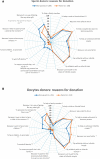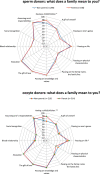Motivations and personality characteristics of candidate sperm and oocyte donors according to parenthood status: a national study from the French CECOS network
- PMID: 36382009
- PMCID: PMC9641712
- DOI: 10.1093/hropen/hoac042
Motivations and personality characteristics of candidate sperm and oocyte donors according to parenthood status: a national study from the French CECOS network
Abstract
Study question: In a non-commercial national gamete donation programme, do the motivations and personality characteristics of candidate sperm and oocyte donors differ according to their parenthood status?
Summary answer: Moderate differences exist between non-parent and parent candidate donors in motivations for gamete donation and representations as well as in personality characteristics.
What is known already: Several studies have analysed the motivations and experiences of oocyte or sperm donors, but mainly in countries where gamete donation is a commercial transaction, and very few studies have reported results of personality traits using personality inventory tests. No study has specifically investigated the motivations and personality characteristics of candidate gamete donors according to parenthood status.
Study design size duration: A prospective study was carried out including 1021 candidate donors from 21 centres (in university hospitals) of the national sperm and egg banking network in France between November 2016 and December 2018.
Participants/materials setting methods: In total, 1021 candidate gamete donors were included in the study. During their first visit, male (n = 488) and female candidate donors (n = 533) completed a questionnaire on sociodemographic characteristics, their motivations for donation and their representations of donation, infertility and family. Secondly, a NEO Personality Inventory (NEO-PI-R) exploring the Big Five personality traits was completed online. Results were compared between parent and non-parent candidate donors.
Main results and the role of chance: Altruistic values were the principal motive for donation irrespective of parenthood status. Reassurance about their fertility or preservation of sperm for future use was more often reported in non-parent than in parent candidate donors. With regard to representation of gamete donation or of the family, independently of their parenthood status, candidate donors more frequently selected social rather than biological representations. Mean personality characteristics were in the normal range. Non-parent candidate donors had higher scores on openness and depression than parents, while parent candidate donors appeared more social than non-parents.
Limitations reasons for caution: The personality characteristics inventory was not completed by all candidate donors included in the study. However, family status did not differ between the two groups (NEO-PI-R completed (n = 525) or not), while the group who completed the NEO-PI-R had a higher educational level. This national study was performed in a country where gamete donation is subject to strict legislation.
Wider implications of the findings: In a global context where reproductive medicine is commercialized and gamete donor resources are limited, this study found that altruism and social representations of gamete donation and family are the main motivations for gamete donation in a country which prohibits financial incentive. These findings are relevant for health policy and for gamete donation information campaigns.
Study funding/competing interests: Grant from the Agence de la Biomédecine, France. The authors have nothing to disclose related to this study.
Trial registration number: N/A.
Keywords: NEO Personality Inventory; altruism; gamete donation; motivations; oocyte donation; parenthood status; personality characteristics; social representation; sperm donation.
© The Author(s) 2022. Published by Oxford University Press on behalf of European Society of Human Reproduction and Embryology.
Figures








References
-
- Agence de la Biomédecine . Assistance médicale à la procréation. Don d’ovocytes. Donneuses d’ovocytes et couples receveurs. Saint-Denis La Plaine, France. 2020a. https://rams.agence-biomedecine.fr/don-de-spermatozoides-0 (1 February 2022, date last accessed).
-
- Agence de la Biomédecine . Assistance médicale à la procréation. Don de spermatozoïdes. Donneurs et couples receveurs. Saint-Denis La Plaine, France. 2020b. https://rams.agence-biomedecine.fr/don-de-spermatozoides-0 (1 February 2022, date last accessed).
-
- ASRM. Practice Committee of the ASRM and the practice Committee for the SART. Guidance regarding gamete and embryo donation. Fertil Steril 2021;115:1395–1410. - PubMed
-
- Boivin J, Bunting L, Collins JA, Nygren KG.. International estimates of infertility prevalence and treatment-seeking: potential need and demand for infertility medical care. Hum Reprod 2007;22:1506–1512. - PubMed
LinkOut - more resources
Full Text Sources
Medical
Research Materials
Miscellaneous
